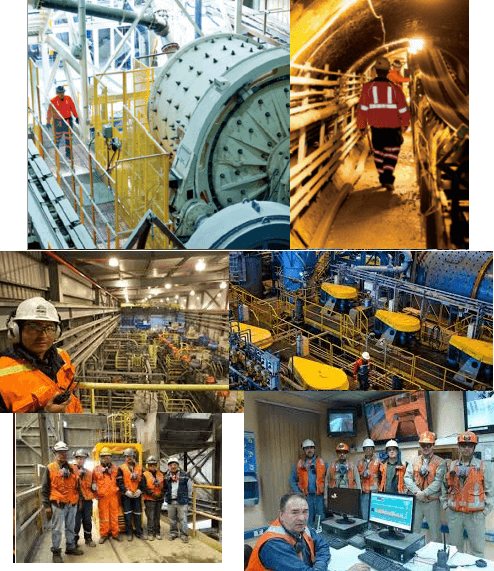
Grinding circuits are made up of large, moving pieces of machinery. When carrying or moving objects in and around this equipment extreme care should be taken. As an example, when operating the crane, never hoist anything directly over the mills. If it is necessary to take long pieces of material, like pipes and lumber in between or around this equipment, have a person on each end of the load to do the carrying. This will keep the load under positive control are all times. Often the machinery itself will be a danger. Slurry lines that are under pressure are always in danger of bursting seams, drive belts on pumps slipping badly enough to burn. This will create toxic fumes and a great deal of smoke.
One danger that operators should be aware of, is torque converters and couplers. Oil is the primary fluid that is used in both of these devises. If for some reason the equipment must be started up and shut down three or four times, in rapid succession, this oil may become hot, producing pressure. To prevent a build-up of pressure from rupturing seals and oil lines, a safety plug is installed in them. This plug is made from lead and is designed to blow out should the pressure become too great. If this happens, it will spray hot oil all over the place. The operator should be sure that there isn’t anybody standing around the torque converter or coupling on start-up.
Electric motors are another dangerous area, around mills there is a lot of water. Water is being added to the mills, water is used to keep discharge screens clean. Water hoses are employed to wash floors, even the mills themselves. These larger motors require 4160 volts to operate. Therefore generate a lot of heat. As a result most are not protected by being enclosed.
The point is that these motors are, on the whole, unprotected from the water. Mixing water with four thousand one hundred and sixty volts is not a good idea. The rotation of the armature will protect the motor to a certain degree by the wind that it creates. Unfortunately it is not an absolute protection. All personnel that work around a concentrator plant should be aware of this and use hoses and water very carefully. To be honest I have never heard of any one being electrocuted in this manner but that isn’t to say it can’t happen. I have heard of a couple of motors being ruined this way though.
As I said before the equipment that you are working with is big and it is heavy. Much of the work will be accomplished either with mobile overhead cranes, forklifts or other devises that are designed to help carry these great weights. In many cases you will be working in very close quarters with the mills or pumps. Under these conditions it is very easy to make a mistake and become involved in an accident. One of the best ways to protect yourself is with knowledge. If you are unfamiliar or unsure as how to operate any piece of equipment get checked out on it first, then operate it. Don’t just jump into an unfamiliar piece of equipment, be smart, think safety and get taught.
Be very attentive to who is working around your area and be sure that that everyone is aware of startup and shut down procedures, Do not let it be your inattentiveness that was responsible for someone else’s accident. Do you remember what it was like on your first day on the job, unsure of who to see, where to go and what to do? When you have a new man working in your area try and help him over this period. It can be very frustrating for him and mistakes are easily made. There is also the good possibility that that new man will eventually be your “cross-shift” so the more he knows the better it will be for you.
